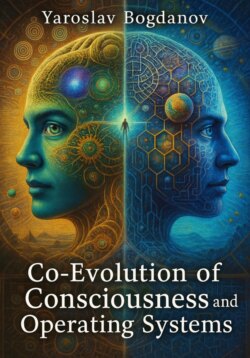Читать книгу Co-evolution of consciousness and operating systems (Коэволюция сознания и операционных систем) - Ярослав Вячеславович Богданов - Страница 3
Preface
ОглавлениеIn the late 1980s, when I was a high school student, I became interested in the forms of matter movement and their evolution. At the time, I was aware of several primary forms of matter movement: physical, chemical, biological, and intelligent [1]. From my father, a professor of biology, I learned that these forms evolve over time. In my view, the simplest form was the physical, followed by the chemical, biological, and finally the intelligent form of matter movement. Back then, I believed that these forms differed from one another through qualitative leaps, somewhat akin to the process of aromorphosis in living organisms. It was clear to me that the mechanism behind such leaps must be the same for all forms of matter movement.
At that time, I was deeply fascinated by chemistry and biology. I viewed life as a continuation of chemistry. In physics, I was particularly drawn to the field of thermodynamics. Beyond the school curriculum, I remember reading Peter Atkins’ popular book «Order and disorder in nature» [16]. I was familiar with the concept of entropy and aware of the anti-entropic properties of life. I also studied Academician A. I. Oparin’s book on the origin of life from coacervate droplets [8]. Magazines such as «Science and life», «Technology for youth», and «Chemistry and life» were invaluable resources for me, as they often discussed the topic of the origin of life. My go-to book was «The Universe. Life. Mind» by I. S. Shklovsky, which devoted significant attention to life, intelligence, and their cosmic role [14]. I didn’t overlook the works of V. I. Vernadsky, reading some of his writings as well [3]. I was also captivated by Erwin Schrödinger’s book «What is Life? From a Physicist’s Viewpoint» [15]. Thus, my father’s idea that “life is a hierarchy of enzymatic systems” found fertile ground in my prepared mind.
Our biology lessons were taught by a wonderful young teacher, Dmitry Vadimovich Dubikovsky. The novelty of his teaching approach, the way he analyzed alternative theories of the evolutionary process and the origins of life, also stirred my imagination. One phrase of his stayed with me: “As a result of evolution, love multiplies in the world.”
All of this – what I now recall, and perhaps other things I’ve forgotten – gave rise to a personal definition of life. My own. These thoughts remain among the most important to me even today. I developed them slowly over the years in notes and writings, but never expressed them in a cohesive form for a broader audience. It took time for me to mature enough to do so. The ideas evolved and grew richer, but their essence remains the same. For me, a Soviet high school student, writing a serious philosophical work was an insurmountable task. The challenges I faced then were entirely practical: finishing school, entering university, obtaining a higher education, and becoming a doctor. Of course, these responsibilities distracted me from my schoolboy discoveries, but I never abandoned them.
I have long been studying topics far removed from evolutionary biology, theoretical medicine, and even cybernetics and its related fields. For many years, I have focused on forensic and general psychiatry. In this area, I dabbled in something resembling scientific research for a time, though I didn’t achieve much success. Yet, passion draws the amateur back to familiar paths! And I’m not particularly embarrassed by this, even though I can imagine the smiles of knowledgeable professionals who might decide to read my work. I understand that there are entire scientific schools dedicated to the theory of language, evolutionary biology, neuropsychology, and many other subjects. But knowing my own field, for example, I can say with near certainty that despite the pomp and rigor of the knowledge I rely on in daily practice, despite the brilliance and intellect of thought leaders, and despite the many international and local classifications, psychiatry will change beyond recognition in another fifty years (if not sooner!) – in its views, methods of treatment, and many other aspects that seemed immutable just yesterday.
I understand how much psychiatry relies on authority, how much conventionalism there is, and how much remains unclear and speculative – knowledge that persists (often imprecisely) simply because no alternative has yet emerged. Tomorrow, it all might collapse like a house of cards, but only when a worthy replacement appears. New knowledge, a suitable tool – after all, knowledge is primarily an adaptive mechanism for humanity. When one becomes obsolete, another takes its place. And that’s as it should be. When it comes to understanding the psyche, its nature, and the paths of its evolution, especially in connection with the evolution of society, we are merely skimming the surface. Much of what is presented today by authoritative figures as part of scientific knowledge is little more than a blend of speculation and conventionalism – and often this is not even concealed. People express their opinions, which vary in quality, of course. Opinions are not all the same. And so, I decided to share what I have pondered for many years. Compiling individual notes, thoughts, and phrases into a unified whole was quite challenging, but it brought me immense satisfaction! I hope that reading this work will be beneficial to you as well, dear readers.
For those interested in the terminology I use, a glossary of key terms and their definitions is provided at the end of the book, just before the references section.
